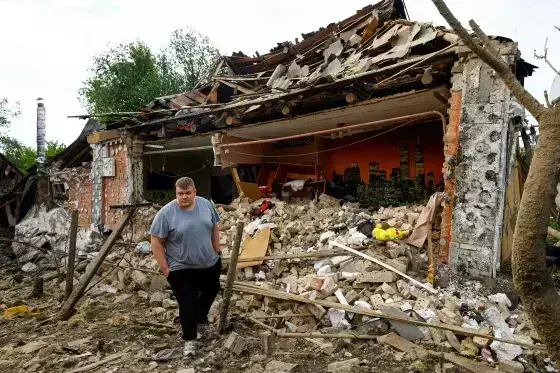Trump to Urge Putin for Ukraine Ceasefire in High-Stakes Call Amid Global Pressure

Trump to urge Putin to accept a 30-day Ukraine ceasefire in a key call, amid global pressure and ongoing Russian attacks on Ukrainian civilians.
U.S. President Donald Trump is preparing for a critical phone call with Russian President Vladimir Putin on Monday, aiming to halt the ongoing “bloodbath” in Ukraine. Trump announced the call, scheduled for 10 a.m., would also be followed by discussions with Ukrainian President Volodymyr Zelenskyy and NATO allies.
Vice President JD Vance, speaking from Rome, said Trump would press Putin on his willingness to pursue peace, adding that economic incentives for Russia are contingent on ending violence against civilians. “You don’t get the benefits if you keep killing innocent people,” Vance stated after meeting with Pope Leo XIV.
Kremlin spokesperson Dmitry Peskov acknowledged the U.S. initiative, calling it a “preferred” peaceful route. Peskov also indicated that a possible in-person meeting between Trump and Putin remains on the table but depends on mutual agreement and logistics.
Ahead of the Trump-Putin call, leaders from Britain, France, Germany, and Italy expressed support for Trump’s ceasefire push. A joint statement emphasized the importance of holding Russia accountable, including potential sanctions if Moscow fails to engage in meaningful talks.
French President Emmanuel Macron urged Putin to accept a proposed 30-day unconditional ceasefire, backed by both Ukraine and European allies. Despite the diplomatic overtures, Russian attacks on Ukraine persist, including a deadly shelling in Kherson on Sunday that killed a 75-year-old woman.
Trump’s approach to the conflict has faced sharp criticism. Former U.S. Ambassador to Ukraine Bridget Brink, who resigned last month, accused the administration of pressuring Ukraine instead of confronting Russia directly. “Peace at any price is not peace at all — it is appeasement,” Brink warned in an op-ed.
Meanwhile, Russia has intensified domestic repression. On Monday, the Kremlin banned Amnesty International, labeling the group “undesirable” and accusing it of promoting “Russophobia” and supporting extremist activity.
Despite continued violence and human rights concerns, Trump remains focused on what he calls a pragmatic peace. In a Truth Social post, he claimed over 5,000 soldiers are dying weekly and vowed that Monday’s discussions could lead to a ceasefire and end “a war that should have never happened.”
Though Trump once promised to end the war within 24 hours of taking office, his second term has proven more complicated. While negotiations in Istanbul last week marked some progress, the two sides remain deeply divided. Russia is demanding Ukrainian capitulation, a position Kyiv firmly rejects.
As the world watches, Monday’s phone call could be a pivotal moment in determining whether diplomacy can finally bring relief to a war now in its fourth year.















